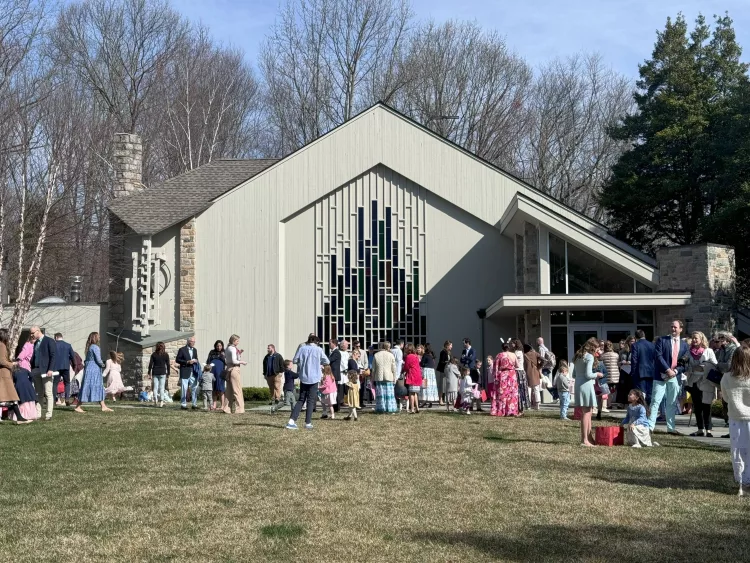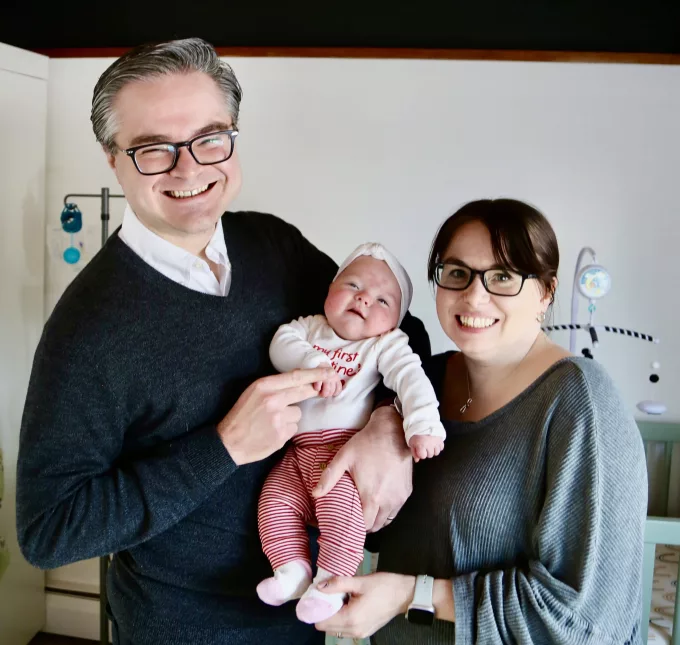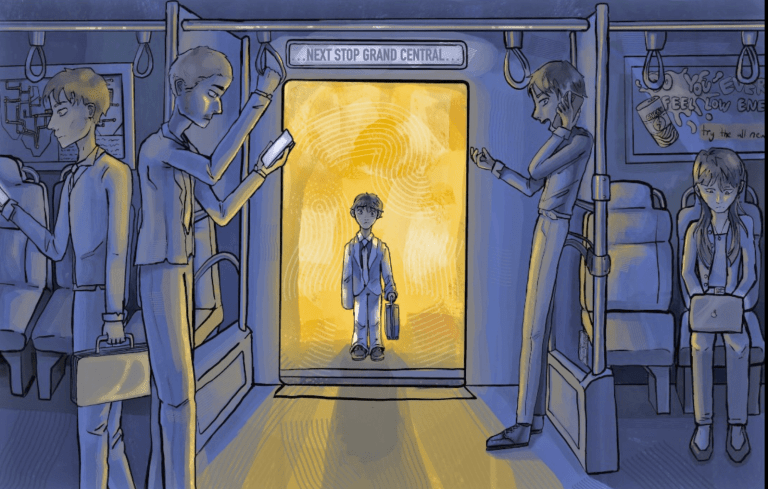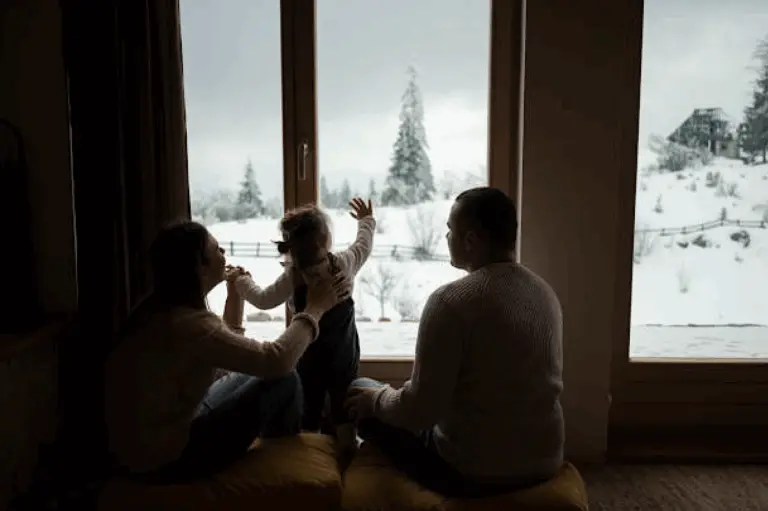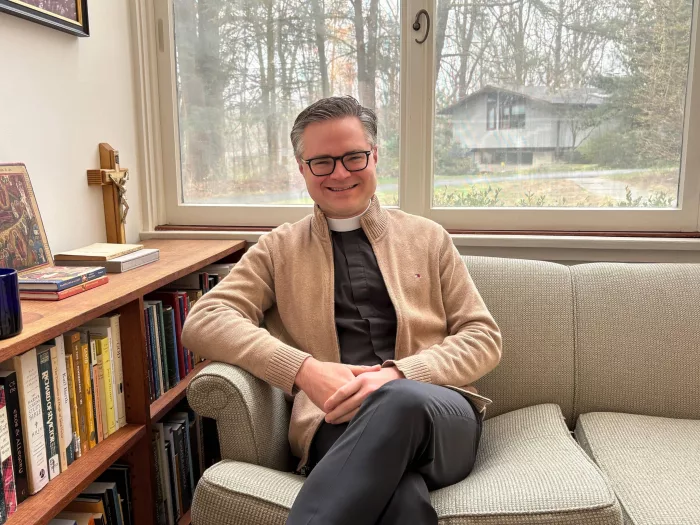
By Anne W. Semmes
In backcountry Greenwich there is a small but expanding Episcopal church called St. Barnabas, initially created as a chapel by Christ Church Greenwich for its backcountry parishioners. Its first service occurred in 1956 on June 10, the eve of the Feast of Saint Barnabas, a first century apostle and martyr from the island of Cyprus “whose name has traditionally been associated with farming,” though this church is surrounded by stretches of woodland.
Today, that church is cutting edge modern, as designed by the late, distinguished architect and parishioner, Philip Ives. And in the pulpit is a dynamic young minister approaching 36, the Reverend Dr. Justin E. Crisp, with his doctorate in philosophy in Religious Studies from Yale. And in his congregation are some 130 parishioners – “with almost 40 being kids,” he tells, about double the number of the congregation when he first arrived two years ago at Easter.
Behind the church is the Rectory housing Crisp’s young growing family, wife Dr. Jewelle Bickel, and their seven-month-old daughter Beatrice, and visiting at Easter time his parents from his farmland home in East Tennessee. But Jewelle is also much caught up in the church as newly appointed director of Children’s Ministry. She joins associate rector, the Rev. Phoebe Oler (with former Christ Church ties) who oversees the Youth Ministry, ages 9 and up.
“So, we have discovered at St. Barnabas,” tells Crisp, “that ministry to children and youth is one of our spiritual gifts.” And that, “every congregation has a charism, a spiritual gift given it by God. And part of that is the community of parents who are bringing their kids here…three to four Sundays a month…They’re trying to give their kids a foundation, unconditional love, and values that are going to help them to flourish in a world that is doing everything it can to make sure they don’t.”
Crisp sees “people desperate for connection with anything.” “I had a young man in my office yesterday who asked me the question, what’s the meaning of life?… I think people are looking for some way to answer that question for themselves. They can do that in a church, and they’re willing to try anything, even if they’re not sure about God or the resurrection of Jesus Christ, or the Virgin birth. They’re willing to try anything now. And so, they come.” He wants St. Barnabas “to be a place where people can say, everybody’s talking about the mental health crisis for our youth and St. Barnabas is doing something about it.”
“In the first letter of John,” says Crisp, “the author says we love because God first loved us. And if we are so transformed by the fact of God’s one way love for us, we can have that same one-way love for one another and for the world.”
That one-way theology came to Crisp from two mentors – Episcopal priest Fleming Rutledge, former member of Christ Church and former minister at Grace Church in Manhattan, and from Paul Zahl who served with Rutledge. “Fleming and Paul are both Episcopalians and their theology is focused on what Paul calls God’s one way love for us, that love has no conditions. If we reciprocate that love, of course that’s better for us. But God’s love is one way. It is being poured out upon us no matter what.”
Crisp also adds Martin Luther as another influencer. “Both Fleming and Paul are really influenced by Luther, and the idea that you and God are okay…because God has made it so, not because you did anything to earn it, it’s just given to you as a gift.”
But it was Crisp’s parents as Southern Baptists (his grandfather was a Southern Baptist minister of “a more moderate school”) who had first taught him that “God was a God of unconditional love and there was nothing that we could do to get on this God’s bad side. This God was always going to be in our corner pulling for us.”
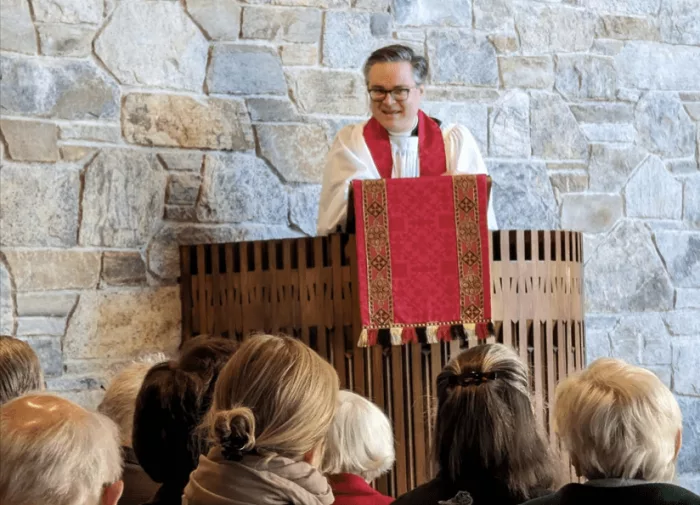
It was a high school friend who introduced Crisp to an Episcopal church in a nearby town that had him “blown away by the beauty of God.” “I walked out of the church, and I knew two things. I was a junior in high school. I knew I was supposed to become an Episcopalian, and I knew that I wanted to be a priest.”
But it is that unconditional love message from his parents that Crisp so often includes in his much-praised sermons – also accessible online. He says he has a number of livestreaming listeners. He also notes his church has attendees from Christ Church sometimes making the drive. “The idea that backcountry was just too far away is incomprehensible for us today,” he adds, and “Some of our folks from St. Barnabas go in town to Christ Church.” Add that increasing partnering going on with the two Episcopal parishes.
“We share our Cuba mission. We share the ‘Courage and Faith’ speaker series.” The Reverends Marek Zabriskie and Justin Crisp now “host it together… we decide together on the guest speakers. (Along with pivotal Christ Church member John Ford.).
Crisp addresses the upcoming Easter Sunday as “Easter Joy.” “There’s going to be incredible music, and the choir are amazing. We’ll have brass with the organ. If people are feeling down about anything, they can come and just get cheered up at church on Sunday at 9 or at 11.” But the “real highlight,” he says will be at 10 o’clock, “where we’ll have the world’s fastest Easter egg hunt.”
There will be multiple egg hunts for “for different age ranges,” he tells, as organized by wife Jewelle and Rev. Holer. “So, there’s easy, medium, and hard difficulty levels” on the Easter egg hunt. Crisp notes that “Christianity has a reputation for being kind of a downer. We’re like the moral scold of American culture.” But “people forget that Christianity says it’s okay if you have fun. So, Easter, I hope, will be a day where people can come and be filled with joy and just have some fun with each other.”
Surely it will be a joyful Easter with their seven-month-old daughter recently out of hospital. The extraordinary story goes, daughter Beatrice determined to arrive when her mother was only seven months pregnant. With this sudden to-be arriving at the rectory, father-to-be Crisp was calling 911. “They were at our house like three to five minutes, at the most.” During which time mother Jewelle had herself delivered her daughter. “My wife is an extraordinary woman.”
“Beatrice is from the Latin beatus which means blessed,” he tells. “We named her right after she was born, before the ambulance arrived. We looked at her and we knew that was her name. She’s awesome.” But Beatrice would spend her first five months in Greenwich Hospital arriving home last month.
Rev. Crisp now believes, “God meant for me and Jewelle and Beatrice to be at St. Barnabas…We were supposed to be here at the rectory when Beatrice was born prematurely. We are right around the corner from the GEMS backcountry station just below Parkway School.” His hope he shares, is that
“God meant for us to be here for some kind of good for the community.”
